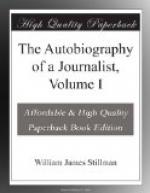I took my conge as secret agent, but it was understood that when the renewal of the revolt from Austria, to which he looked forward at no distant time, was at hand, I should take the place to which I had looked forward in the beginning. I saw one of Kossuth’s associates subsequently, after the failure of Mazzini’s Milan movement in the spring of 1853; and he then told me of the failure, and how the Hungarian soldiers, as had been ordered, refused to fire on the insurgents and had been decimated and sent to Croatia. More than thirty years after, I went to see Kossuth at Turin, and introduced myself as the young man who went to Hungary for him to carry off the crown jewels. He burst out with an impetuous denial of the existence of the expedition. “But,” said I, “I have your letters written to me in Pesth.” “I should like to see those letters,” he replied. I promised to send them, conditionally on his promise to return them; but thinking it over, I sent him only one, inclosed in a stamped envelope directed to myself, with a letter recalling the promise to send it back. I never heard from him again, however, and saw that he only wanted to get the letters to suppress their evidence.
CHAPTER VIII
AN ART STUDENT IN PARIS
I went to Paris to wait for the impending rising in Milan, and meanwhile entered the atelier of Yvon, not to lose my time. My only English-speaking companion in the atelier was a younger brother of Edward Armitage, the Royal Academician; the popular atelier at that time for the English and American students being that of Couture. Yvon had about thirty pupils, to whom his attentions were given gratuitously and conscientiously, three times a week, with rare exceptions of the Saturday visit, by the pupils regarded as the least important. Of the thirty there were not more than a half dozen who showed any degree of special aptitude for their work, and only two were regarded by their colleagues as likely to be an honor




